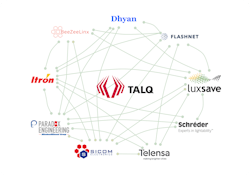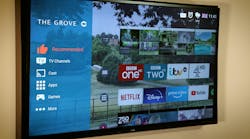Piscataway, NJ, USA– October 13, 2021 – The TALQ Consortium, which developed a global OpenAPI interface standard for smart city device networks, has just completed another – this year purely virtual – plugfest. TALQ’s regular plugfest events play an important role in assuring the reliability and correctness of the certification process as well as the protocol itself. During these sessions development teams from member companies tested their integrations against each other’s and validated the behavior and outcome of the Test Tool suite. After two weeks of intense work, 35 different pairing sessions have proved the interoperability of all systems and the reliability of the TALQ Test Tool.
A plugfest is one of the most important events for anyone working with standards, whether defining or implementing them. That’s why the TALQ Consortium has organized regular plugfests, open to all member companies, since 2015. These events give the Consortium the opportunity both to verify the Certification Test Tool and to continue improving the TALQ Specification clarity. This regular testing of the integration of real systems from different vendors and careful analysis of the output of the Test Tool is a significant and differentiating strength of the TALQ Smart City Protocol and the Consortium itself.
The benefits of a virtual plugfest
As in 2020 and 2021 the covid-19 pandemic made a physical event impossible, the Consortium decided to organize a virtual event. Nine member companies signed up to participate and submitted 13 products – both Central Management Software (CMS) and Outdoor Device Networks (ODN or gateways) – to mutual online testing. Despite the challenge of remote working the participants agreed that it was a major success, improving their products and encouraging them to respond to further TALQ-mandating tenders.
During the event, the development teams tested their interpretation of the protocol using real products. This presented them an opportunity to make their products more flexible and reliable by verifying the interoperability with other members' products. Furthermore, backward compatibility between different TALQ versions was confirmed and minor bugs on several sides were fixed.
“The event provided participants an extraordinary networking opportunity to exchange with other members, which was exploited intensively. All participants agreed that further plugfests would be a valuable addition to future integrations” reported José Sanchis, Chairman of the Certification Work Group, who managed the event.
“As we continuously improve the TALQ protocol and expand the range of use cases, we will continue to plan at least one plugfest each year” added Simon Dunkley, Secretary General, TALQ Consortium.
About the TALQ Consortium:
Founded in 2012, the TALQ Consortium has established a globally accepted standard for management software interfaces to control and monitor heterogeneous smart city applications. The TALQ Smart City Protocol is a specification for information exchange, suitable for implementation in various products and systems. This way interoperability between Central Management Software (CMS) and Outdoor Device Networks (ODN) from different vendors will be enabled, such that a single CMS can control different ODNs in different parts of a city or region.
TALQ is an open industry consortium currently consisting of about 50 member companies.
For more information visit www.talq-consortium.org
Certified TALQ-Compliant Products (TALQ Version 2):
Central Management Software (CMS):
• CityLinx from BeeZeeLinx, France
• City Vision from Capelon, Sweden
• IBOR from CGI, the Netherlands
• LightingGale from CIMCON, USA
• StreetMan from Dhyan, USA
• inteliLIGHT CMS from Flashnet, Romania
• SLV CMS from Itron, USA
• SmartLinx from LED Roadway Lighting, Canada
• LuxSave Streetlight CMS from LuxSave, Sweden
• PE Smart CMS Neptune from Paradox Engineering, Switzerland
• EXEDRA from Schréder, Belgium
• CityMESH CMS from SICOM, Chile
• PLANet from Telensa, United Kingdom
• CityManager from TVILIGHT, the Netherlands
• Smart Firefly from Uvax, Spain
Outdoor Device Network (ODN) / Gateway:
• Citybox from Bouygues, France
• NearSky from CIMCON, USA
• Flashnet IoT platform from Flashnet, Romania
• SLV Gateway from Itron, USA
• Tegis from LACROIX City, France
• Ki from Lucy Zodion, United Kingdom
• LuxSave Streetlight GW form LuxSave, Sweden
• Mayflower CMS incorporating TALQ Gateway from Mayflower, United Kingdom
• WixLi Portal GW from NEXIODE, France
• PE Smart GW from Paradox Engineering, Switzerland
• EXEDRA from Schréder, Belgium
• Owlet IoT from Schréder, Belgium
• SELC Gateway from SELC, Ireland
• CITY GATEWAY from SICOM, Chile
• Access Point System from Smartnodes, Belgium
• AGIL IoT Platform from ST Electronics (Info-Comm Systems), Singapore
• T-Light Gateway from ST Engineering Telematics Wireless, Israel
• Trilliant TALQ Gateway from Trilliant, Canada
• CA-13 from Uvax, Spain
• Witti TALQ Gateway from Witti, France
Contact:
Eva Jubitz
TALQ Communications Consultant





